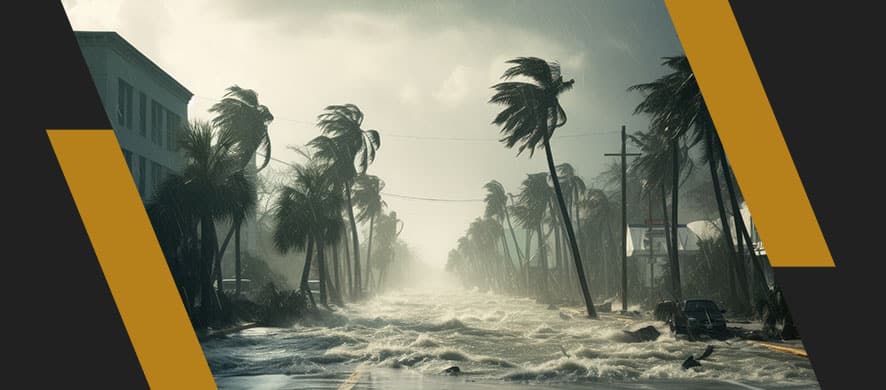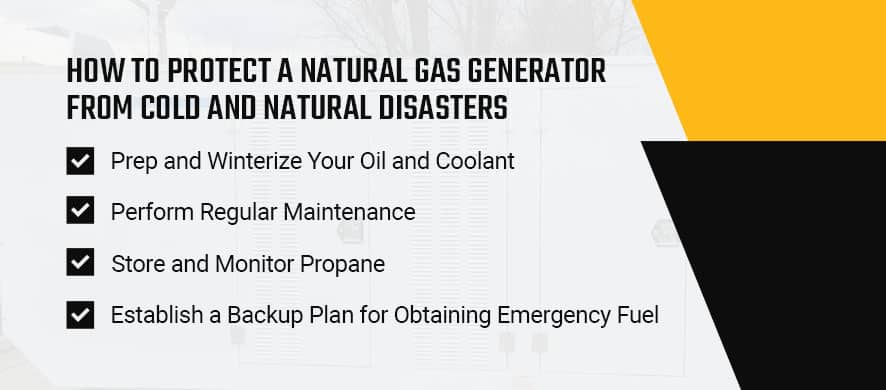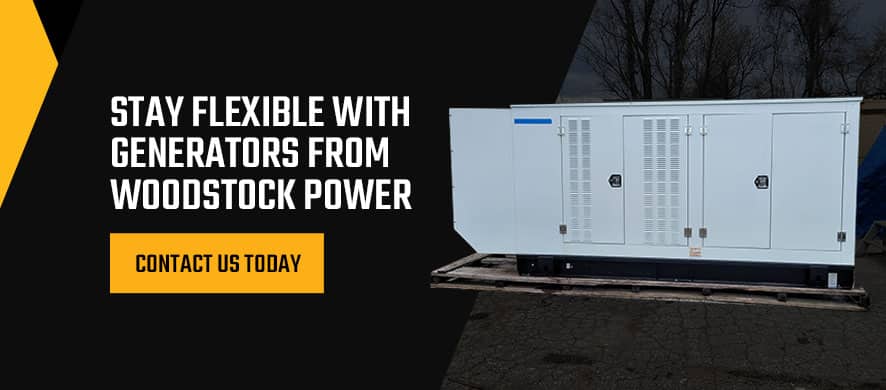Weather and Natural Disaster Considerations for Natural Gas Generators

For many organizations, natural gas generators offer reliable power in an affordable, clean-burning system. But as with other types of equipment, you may need to take some extra precautions to use natural gas generators during disasters or cold weather.
Understanding your operating conditions and preparing for threats can help you protect your natural gas generator from cold weather and natural disasters — and avoid downtime or interruptions.
Using Natural Gas Generators During Natural Disasters
Natural gas generators usually get their fuel from utility pipelines, which is both a significant advantage and a challenge. Obtaining fuel is extremely convenient, but many utility companies shut off delivery during natural disasters, preventing the generator from running when you need it most. Natural gas shutoffs are particularly common in areas prone to earthquakes or wildfires. Fortunately, newer technologies add more flexibility and mitigate the risk of natural gas shutoffs, making these generators much more reliable during natural disasters.
Many of today’s generators can run on both natural gas and liquefied petroleum gas (LPG), also known as propane. You can use your generator with convenient natural gas for everyday use. Then, if the utility provider cuts off the supply, you can easily switch over to propane to avoid unnecessary downtime or business interruptions. Many newer generators come with this capability, but you can also use a conversion kit to retrofit generators that don’t support LPG.
Many businesses have historically used diesel due to easy fuel access and more consistent power delivery. LPG support and other innovative technologies have made natural gas generators a particularly effective backup solution with reliability on par with diesel. Swapping to natural gas also helps organizations get ahead of evolving emissions regulations.
Using natural gas generators during natural disasters offers several advantages compared to diesel, such as:
- Lower emissions
- Affordable acquisition and fuel costs
- Reliable fuel access
- Quieter equipment
Natural gas has even earned a place in California’s emergency response plan, implemented by the Department of Water Resources (DWR). The DWR deployed natural gas generators to provide up to 120 megawatts of power during wildfires, extreme heat events and other climate-driven energy emergencies. Plus, analysts expect the market for these generators to keep growing.
California’s efforts are an excellent display of how natural gas can match the reliability of fossil fuels during natural disasters. The California Air Resources Board (CARB) works to control air pollution and promote more sustainable energy options. With the right technology and preparation, natural gas generators offer clean-burning, quiet and dependable power delivery.
Operating Natural Gas Generators in Cold Weather
Natural gas generators generally work well in cold weather but, like other types of generators, face some challenges. Low temperatures can reduce the pressure in a natural gas generator’s pipelines, affecting performance and preventing consistent power delivery. Fortunately, these issues generally only appear in sub-zero temperatures. While most states in the U.S. don’t see average temperatures this low, cold snaps and storms can cause sharp dips that affect generators.
With these restrictions in mind, many businesses in cold climates benefit from natural gas generators, but operators must prepare for occasions where temperatures drop especially low and may interrupt performance. LPG conversion kits or bi-fuel generators are ideal for use as cold-weather generators.
High altitudes could also affect a natural gas generator. They often usher in colder temperatures, and reduced oxygen levels can impact the combustion process at higher elevations. Talk to your dealer for more details on high-altitude operation.
How to Protect a Natural Gas Generator From Cold and Natural Disasters
Natural disasters and extremely cold weather are some of the situations in which you may need your generator the most. Preparing for these moments can help you avoid interruptions and the extensive costs of downtime.

1. Prep and Winterize Your Oil and Coolant
Stay prepared for any kind of natural disaster or weather issues by checking and regularly replacing your engine oil and coolant. Follow the manufacturer’s suggestions and ensure a full, clean oil supply to prevent unexpected shutdowns.
If your primary concern is cold weather, additives or winterized products can help keep your generator’s internal components running smoothly, even at temperatures where oil and coolant would typically gel. Add a cold-weather stabilizer or use winter-ready versions of oil and coolant to improve cold-weather generator performance.
Propane becomes liquid at minus 44 degrees Fahrenheit, so it should continue to work smoothly without additives during some of the coldest temperatures.
2. Perform Regular Maintenance
Regardless of the conditions outside, a poorly maintained generator significantly increases your risk of malfunctions. Having a regular maintenance schedule is especially important for natural gas generators, as they require more upkeep than diesel generators. This extra maintenance is mostly due to spark plugs, which can go bad, and gas tubes that need immediate replacement if cracks or holes appear.
Create and follow a thorough maintenance plan for natural gas generators, and include these steps:
- Inspect for leaks or damage: Monitoring gas lines for leaks and damage is crucial. Look for any cracks, deformities, pressure variations or odors. Call a professional immediately if you notice problems.
- Check on battery health: Like a car engine, a generator can only start up with a properly charged battery. Monitor the battery’s charge, and inspect it for corrosion or leaks, including on the wires or terminals.
- Run your generator regularly: Your generator may have a self-test feature that allows it to run every week or two. If you do not have this feature, regularly run your generator to keep it in good shape and perform load tests to verify performance.
- Clean the generator: Regularly remove dirt, debris, dust and grime, and check for pests. Keep intake and exhaust areas free of obstructions.
3. Store and Monitor Propane
If you use a bi-fuel generator, check on your propane supply and top it off if you think you might need it. Source high-quality fuel from a reliable supplier.
4. Establish a Backup Plan for Obtaining Emergency Fuel
You may not have much warning before a natural disaster strikes, and some emergencies can leave you without power for long periods. Establish a plan for obtaining emergency fuel. If you use a conversion kit or bi-fuel generator, find a propane provider with emergency delivery services.
Stay Flexible With THE Woodstock Power COMPANY EXPERIENCE
Whether your concern comes from earthquakes, wildfires, storms, extreme cold or something else Mother Nature has in store, a dependable generator can keep your organization moving. Every business is different, so work with a knowledgeable dealer to learn more about whether natural gas generators are right for you. The trusted used generator specialists at Woodstock Power can help you find the right equipment and stay ready for whatever conditions come your way.
Operating globally and headquartered in Philadelphia, Pennsylvania, we have industry experts who focus on commercial generator sets, with in-depth industry knowledge to help you choose the right generator that fits your needs.
We are industry leaders in buying and selling used generators to fit the needs of many businesses, including commercial, industrial, medical, agricultural, and university. This includes facilities like hospitals, better living centers, nursing home, airports, hotels, resorts, restaurants, retail centers, manufacturing, production, and more.
Our experts are ready to assist you from answering any questions you may have about power generator sets to helping you find the best selection in our inventory based on:
- Peak & Average Power Requirements
- Fuel Preference (Natural Gas or Diesel)
- Portability & Stationary Power
- Prime & Standby Generator Requirements
- Available Space & Exhaust Restrictions
We carry only the most top rated new, used, and surplus power generator sets for sale, providing you with a great value generator that will fit your budget.
Our generators have been thoroughly inspected, serviced, and verified, which ensures that you will be buying a quality generator that you can depend on. If a generator is not up to par with industry standards, we make all necessary repairs or modifications, and fully test every generator before we sell. This ensures a full turnkey generator that’s ready to fire up and go!
Due to our wide selection of generator sets, we’re confident that we can find the model that best suits your operational needs and budget.
We also buy used generators in good quality, if you have already upgraded and you’re looking to sell your older model.
Feel free to contact us with any questions, concerns, or inquiries to learn more about the Woodstock Power Company experience and the quality level of products & services we provide.


